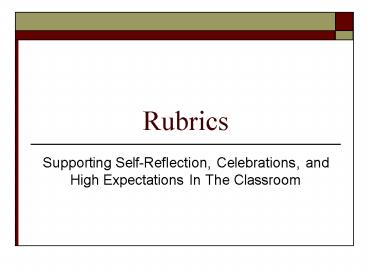Rubrics PowerPoint PPT Presentation
1 / 17
Title: Rubrics
1
Rubrics
- Supporting Self-Reflection, Celebrations, and
High Expectations In The Classroom
2
Guiding Forces of Literacy Instruction
Classroom environment
Rituals and Routines
Classroom community
Knowledge of standards and the 5 components of
reading (What do my students need to learn in
order to be successful readers?)
On-going formative assessment of standards
post-test (Did it work and how well? Where do I
go from here?)
Formative assessment including pre, on-going,
etc. (How do I know what to teach?)
Reading structure(s) that best address
deficiencies (How am I going to organize my
instruction?)
Student deficiencies (What do my students know or
not know?)
Curriculum and materials available to address
deficiencies (What materials do I have to help me
address the deficiencies noted on my assessments?)
Continuum of standards (How am I going to address
the RANGE of deficiencies in my classroom?)
3
Purposes Of Rubrics
- Informs instruction
- Assists with planning and execution of
instruction - Supports assessments used
- Requires student self-reflection
- How did I do?
- What do I need to do now?
4
Knowledge of Standards And Indicators
Standard 3-3 The student will use word analysis
and vocabulary strategies to read fluently. The
teacher should continue to address earlier
indicators as they apply to more difficult
texts. Instructional appendixes are provided as
the baseline expectations for instruction and are
not intended to be all-inclusive
documents. Indicator 3-3.3 Interpret the
meaning of idioms encountered in texts.
5
Support Documents Understanding The Blooms Verb
- Explanation of Revised Blooms Verb
- Interpret Changing from one form of
representation to another by clarifying,
paraphrasing, representing, and translating
http//www.ed.sc.gov/agency/Standards-and-Learning
/Academic-Standards/old/cso/standards/ela/index.ht
ml OR Revised Blooms Taxonomy Documents
6
Task And Standard Alignment
Interpret the meaning of idioms encountered in
texts.
The students will write an explanation of the
figurative meaning in the text on one page and
illustrate. On the opposite page, the students
will write an explanation of the literal meaning
of the idiom and illustrate.
The students will read the story King For A Day.
paraphrasing, representing (Support Document)
7
The Task
- The students will read the story King For A
Day. The students will create a booklet with
examples of idioms in the story. The students
will write one idiom expression at the top of
each page in the booklet. The students will write
an explanation of the figurative meaning in the
text on one page and illustrate. On the opposite
page, the students will write an explanation of
the literal meaning of the idiom and illustrate.
Vocabulary from support document
8
Constructing The Rubric Breaking Up The Task
- The students will read the story King For A
Day. The students will create a booklet with
examples of idioms in the story. The students
will write one idiom expression at the top of
each page in the booklet. The students will write
an explanation of the figurative meaning in the
text on one page and illustrate. On the opposite
page, the students will write an explanation of
the literal meaning of the idiom and illustrate.
- Identify and write examples of idioms
- Write the figurative meaning
- Writing the literal meaning
- Illustrate
9
Constructing The Rubric Establishing The
Criteria
- Identify and write examples of idioms 3
- Write the figurative meaning in complete
sentences - Writing the literal meaning in complete
sentences - Illustrate represent figurative and literal
meaning
10
The Rubric
11
The Rubric
12
Final Product
Indicator 3-3.3 Interpret the meaning of
idioms encountered in texts.
The students will read the story King For A
Day. The students will create a booklet with
examples of idioms in the story. The students
will write one idiom expression at the top of
each page in the booklet. The students will write
an explanation of the figurative meaning in the
text on one page and illustrate. On the opposite
page, the students will write an explanation of
the literal meaning of the idiom and illustrate.
13
Other Examples
Main Idea Rubric Standards Addressed 2-1.1
Analyze the details that support the expression
of the main idea in a given literary text. 2-4.2
Use complete sentences in writing.
14
1st Grade Paragraph Rubric Student Friendly
Version
15
Your Turn!
16
Guiding Forces of Literacy Instruction
Classroom environment
Rituals and Routines
Classroom community
Knowledge of standards and the 5 components of
reading (What do my students need to learn in
order to be successful readers?)
On-going formative assessment of standards
post-test (Did it work and how well? Where do I
go from here?)
Formative assessment including pre, on-going,
etc. (How do I know what to teach?)
Reading structure(s) that best address
deficiencies (How am I going to organize my
instruction?)
Student deficiencies (What do my students know or
not know?)
Curriculum and materials available to address
deficiencies (What materials do I have to help me
address the deficiencies noted on my assessments?)
Continuum of standards (How am I going to address
the RANGE of deficiencies in my classroom?)
17
Resources
- http//www.ed.sc.gov/agency/Standards-and-Learning
/Academic-Standards/old/cso/standards/ela/index.ht
ml - http//rubistar.4teachers.org/index.php
- http//www.odu.edu/educ/roverbau/Bloom/blooms_taxo
nomy.htm - http//sph.washington.edu/practicum/Revised20Bloo
m's20Taxonomy20of20Cognitive20Levels.doc

